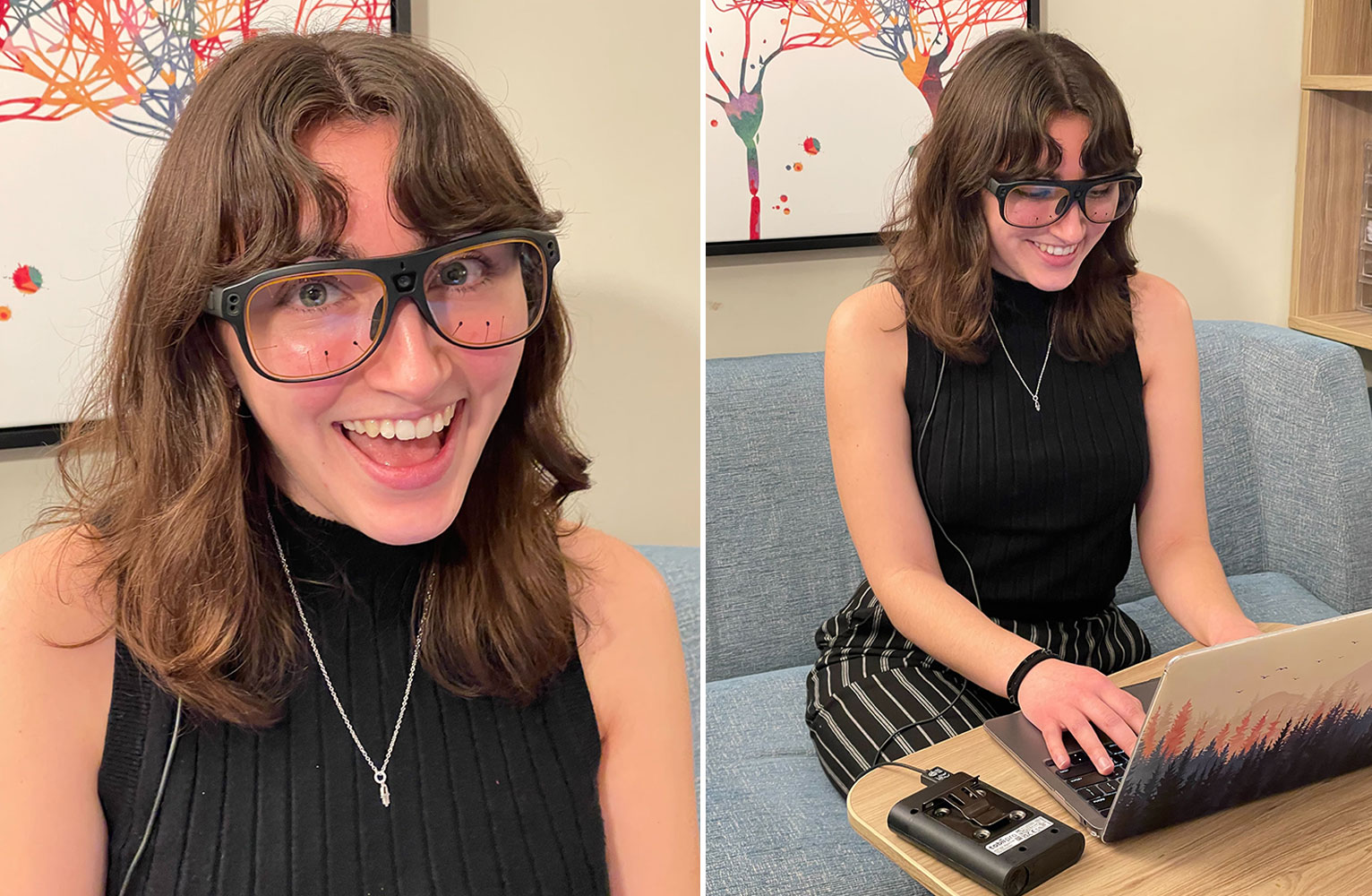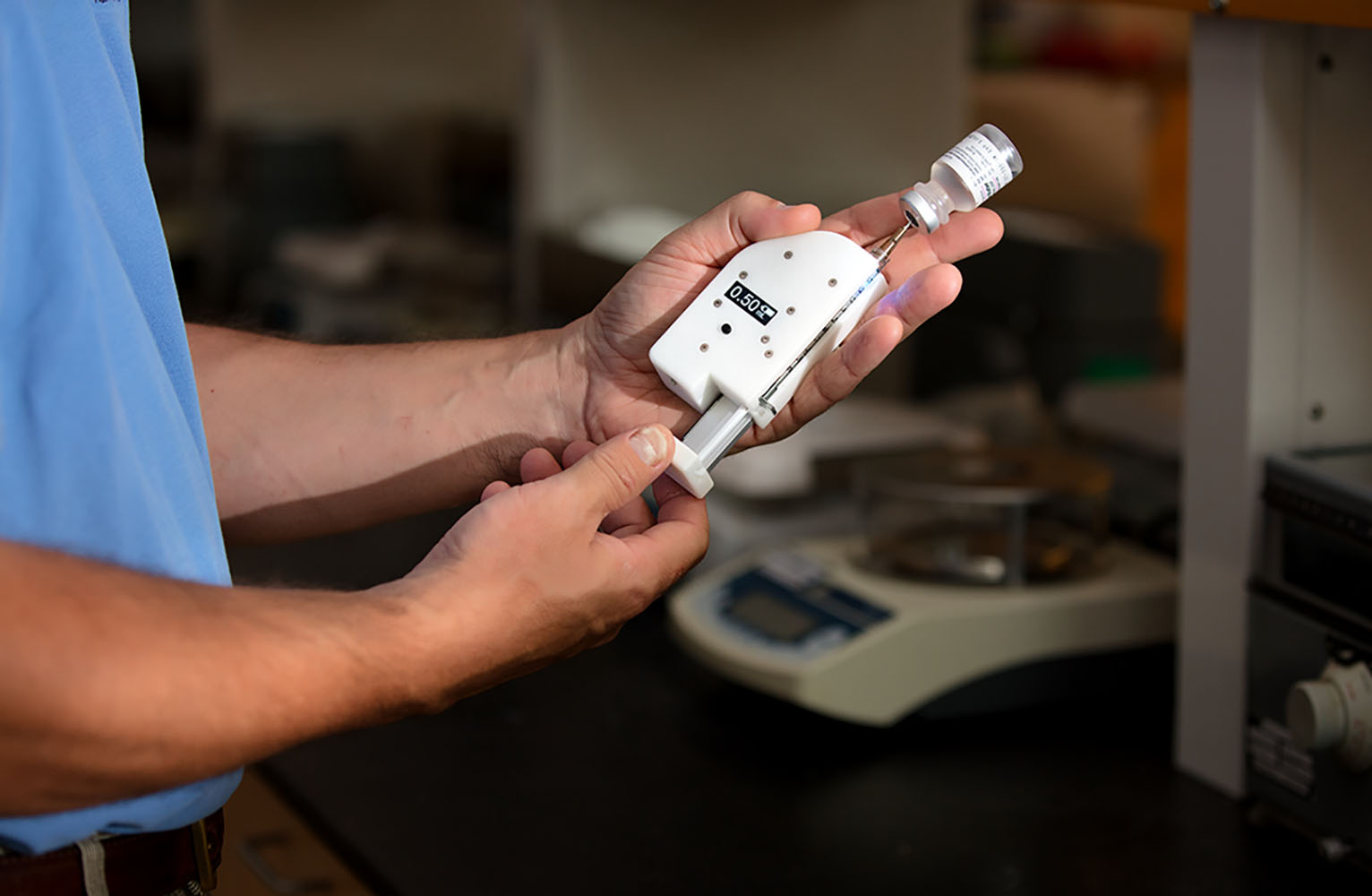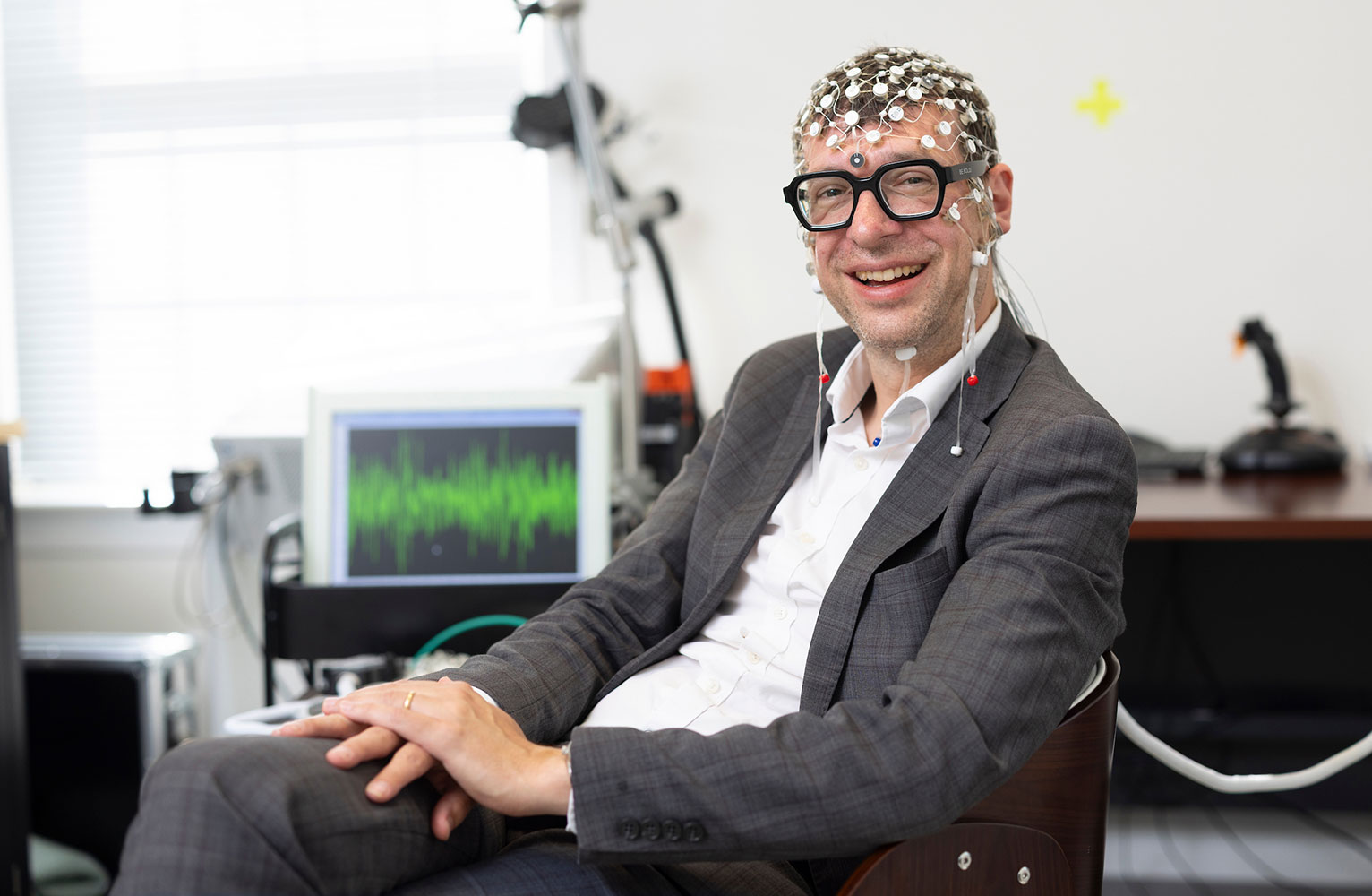
Caroline Cahill, project coordinator at the Winston Center, wears eye-tracking glasses used to analyze how teens visually engage with digital content in real-time. (Photo courtesy of the Winston Center)
How is technology reshaping our brains? Ask the Winston Center.
By Kay Langley ’22, ’24 (M.A.)
Between mindless scrolling, livestreaming and floods of notifications, technology and social media usage by all ages has skyrocketed in the last decade, as screens become more prominent in our social, occupational, educational and creative endeavors.
For adolescents, this presents new challenges to mental health and cognitive development: 95% of teens report using social media and, on average, teens pick up their phones more than 100 times a day. How is this high level of usage impacting the brain development of the next generation?
That’s the challenge the Winston Center for Technology and the Developing Mind at UNC-Chapel Hill is tackling. What aspects of social media are helpful or harmful? How can the virtual world impact teens’ social relationships? What are the best practices to take the good from screen time and minimize the bad?
Jim Winston ’81, ’92 (PhD), a psychologist and chair of the Winston Family Initiative in Adolescent Brain Development and Technology, recognized the pressing need for studies that demonstrate the real effects of screen time on teen cognitive development and mental health. His experiences as a parent and working in the field of addiction led him and the Winston Family Foundation to make a $10 million gift to launch the center in 2022.
“The goal of the center is to help families and educators understand how the increased use of technology shapes children,” Winston stated when the center was founded. “The significant rise in reports of mental health issues, shorter attention spans, lack of empathy and critical thinking, all indicate that parents, educators and caregivers urgently need more information about how to support children and teens as they engage with highly stimulating devices and social platforms.”
Three years later, the center has already made a name for itself. Between applying advanced neuroimaging techniques, providing public health guidance to officials and studying policy to support adolescent mental health, the Winston Center stands out as a leader in this field.
Creating a Centralized Hub
The interdisciplinary core of the center is one of its greatest strengths. Bringing together Carolina’s experts in areas such as neuroscience, psychology, education, public health and psychiatry to form one of the largest research teams on the issue, it’s all hands on deck to understand how being online affects adolescent brains.
The variety of researchers at the Winston Center means it’s one of the only centers in the U.S. to look at the role of social media on all facets of adolescent well-being: social, biological, behavioral and emotional development.
Academic co-director of the Winston Center, Mitch Prinstein, John Van Seters Distinguished Professor of Psychology and Neuroscience and Chief Science Officer of the American Psychological Association, has studied health risk behaviors among adolescents for more than 25 years.
“We know the way our children are interacting with technology now could have remarkable consequences for their development,” said Prinstein. “The research we take on now and how we translate that research into practical resources can ultimately help set our children up for future success.”
Academic co-director Eva Telzer, professor of psychology and neuroscience, is an internationally recognized expert in youth brain development, bringing a much-needed but often lacking perspective on how changes in the brain may make youth particularly sensitive to their social media experiences.
“The teenage years mark rapid brain development that makes teens highly sensitive to their environment. Technology-mediated contexts have the potential to ‘rewire’ the developing brain,” said Telzer. “Scientific research, like ours, will hopefully create the impetus for more monitoring, oversight and regulation of social media platforms.”
Now, the Winston Center is taking its next step. Previously housed within the UNC College of Arts and Sciences, the center is now an interdisciplinary pan-campus unit within the Office of the Vice Chancellor for Research. Strategic planning, infrastructure and support from UNC Research will help the center capitalize on strengths across the University — bringing diverse perspectives to a centralized hub.
Beyond the Lab
Beyond research, experts at the Winston Center are focused on making their information publicly accessible. Their “Handbook on Adolescent Digital Media Use and Mental Health” is open access, providing in-depth analysis for teens, parents and even legislators. Research from the handbook was used to inform the Kids Online Safety Act, legislation approved by the U.S. Senate last year.
It’s just one example of how the center works with nonprofits and governmental agencies to incorporate practical, feasible and legal perspectives — connecting the science to action.
“We are thrilled to welcome the Winston Center to the Office of the Vice Chancellor for Research. Understanding the profound impact of social media on developing brains is a pressing societal challenge that demands insights from across disciplines,” said Vice Chancellor for Research Penny Gordon-Larsen. “This partnership reflects our commitment to pan-campus research collaboration, and we look forward to working with Winston researchers to transform their findings into meaningful action that benefits families, educators and policymakers regionally and nationally.”
The center and its work have been covered extensively within the media, and its academic co-directors have spoken at the World Economic Forum and testified at the U.S. Senate and within several state legislative offices. They’ve worked with several federal agencies to help communicate the science on technology and adolescent development and recently became the research core for the U.S. Phone-Free Schools movement, partnering with schools that have applied phone restrictions to investigate the impacts in the classroom.
As screens continue to dominate our lives, understanding their impact on adolescent development is critical.
“Technology is here to stay,” concluded Prinstein. “Our goal is to understand how people can get the most benefit from these new tools and avoid whatever risks there may be to academic, psychological, biological and social development.”
To maintain full scientific integrity, the Winston Center is funded by private foundations and does not accept money from technology companies. Investing in the Winston Center for Technology and the Developing Mind allows Carolina researchers to advance groundbreaking studies that will enable parents, caregivers and teens to make more informed choices about their interactions with technology and social media. Learn more and contribute.
Related Stories



